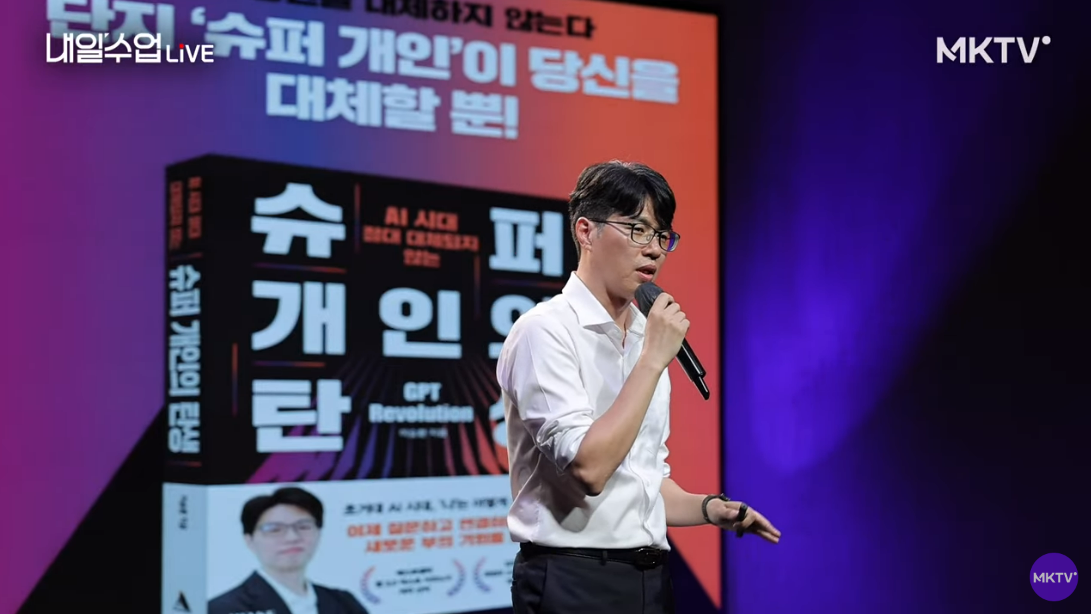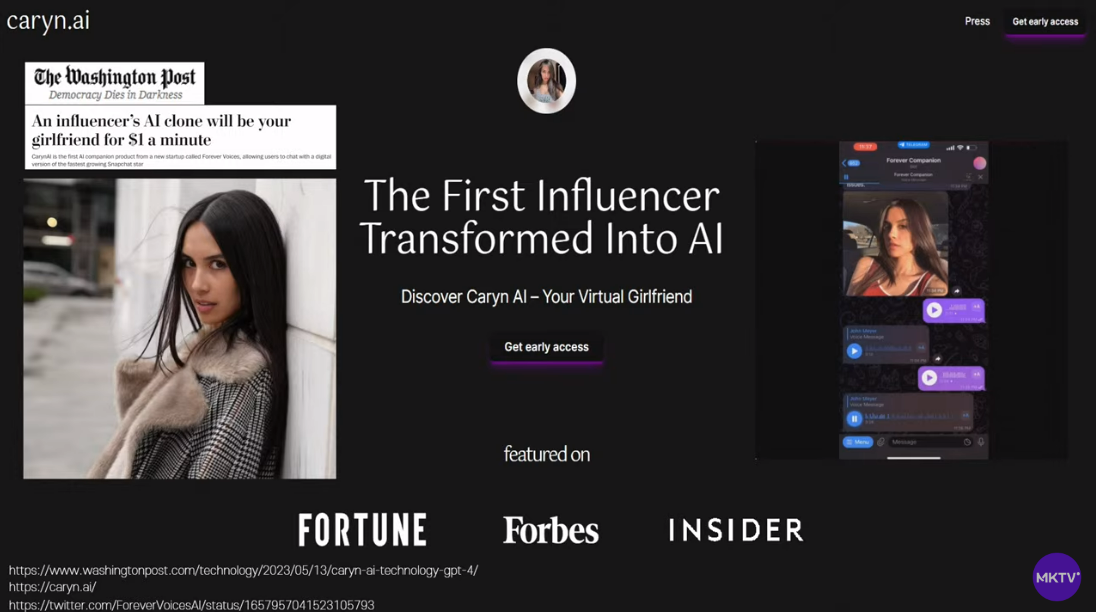The Super Individual: Harnessing the Superpower of AI

Interview with Seunghwan Lee, a researcher of National Assembly Futures Institute
Q1. Why are people so excited about generative AI technologies like ChatGPT?
The first reason is that ChatGPT made communicating with AI so seamless; there is no need to learn complex coding languages. I think it's a breakthrough that a user can communicate with ChatGPT as if he or she was speaking to a human.
The second reason is that ChatGPT can easily and quickly solve practical problems that I face. For students, when I use ChatGPT to generate a report, it produces a well-written report in the blink of an eye. These are the main reasons why I am enthusiastic about generative AI technology.
Q2. What are the current applications of generative AI, and can it be used by non-technical people?
There are many different areas where generative AI can be applied, but there are five main categories. These categories are: text, images, sound, video, and virtual objects such as metaverses.
A prime example of a text-based AI is ChatGPT. ChatGPT's AI generates various texts according to commands, and it has become possible for ordinary people to easily generate images, music, etc. by entering prompts (commands).
Although there are differences in the level of technology maturity in each of the five major areas of generative AI, the gap is closing rapidly, and many tools have already been developed to the point where they can be utilized by the general public.

Q3. We've seen a lot of generative AI technologies from big tech companies lately. Were all of these technologies already in development? Or has AI technology developed rapidly in recent years?
Just as there are some signs before a volcano erupts, there have been some significant events in the field of AI. The most famous one is the emergence of AlphaGo, the AI program that played against the Korean Go player Lee Sedol in 2016. At the time, global companies started to invest a lot of capital in AI research and development, and various AI technologies were introduced at IT conferences and in the media. People were surprised and intrigued by AI's advances, but at the time, they still thought that it was something that would gain prominence in the distant future.
However, when AI technologies like ChatGPT were brought down to the level of user interfaces so that ordinary people could operate them by themselves and see the results, I think this created both shock and excitement as the age of AI arrived. And in the past six months since the release of ChatGPT, big tech companies have unveiled these hidden AI technologies one by one, and we all realized that they are more sophisticated than expected. This revelation has also created a vague fear about the future of wealth and the future of jobs that will be brought about by the revolution in digital technology.
Q4. You say, "The age of search is over and the age of generate is here." What does that mean?
In the past, we had a limited set of tools to create things. For example, we used Photoshop for images and word processors for text, and we couldn't avoid a lot of simple, painstaking manual labor when creating an image or document. But now, we have a lot of alternatives. For example, simple text input or voice commands can be used to integrate complex processes and create stunning pictures or documents in a single step.
The end result is that anyone can produce their desired outcome faster and easier at a lower cost. I expect the gap between those who can use these generative AI tools and those who can't will only get wider over time. That's why you should familiarize yourself with these tools as soon as possible.

Q5. What does it mean to be a one-man unicorn or super individual in the age of AI?
All creation in the digital world starts with a unit called a 'bit'. In the past, we needed computer languages like coding, but now we can easily manipulate bits with AI tools. In the end, we can say that a super individual is someone who can manipulate bits freely and expand their capabilities by 100 times or more. Now, anyone can overcome their limitations and redefine themselves through AI technology.
Q6. You said that AI-generated technology will redefine my limits. Can you explain that in more detail?
Things that are impossible in the real world are becoming easier to realize in the virtual world with fewer costs, less effort, and limited time. As much as I practice, I know that I can't be a singer in real life, but with AI, I can make music and create a virtual 'me' to sing. With the help of AI, I am able to do go beyond my limits, even with limited time and resources, and I hope that you can take a step forward by utilizing AI tools.
Q7. You say that in the age of generative AI, we need to be good at asking questions. What does that mean?
The better the question, the better the answer. Rather than going to a doctor and saying, "I'm sick, please fix me," be specific about how long you've been sick and what symptoms you've had, and the doctor will be able to diagnose you right away.
Going off that, if you ask ChatGPT generic questions, its output will be generic as well, which increases the likelihood of plagiarism. If you utilize AI text tools in this way, you could easily produce 100 books in a short period of time, but it's important to remember that if you don't have your own ideas and ask the right questions, the quality of your output may not be commensurate with your productivity.
Perhaps this is something we need to work on more because when we ask questions and commands with differentiated thinking and creativity, we get higher-quality answers.

Q8. Despite all the hype, some people still haven't tried generative AI tools. Why do you think this is?
Whenever an innovation is adopted, its innovators are the first to embrace it and start using it and then the users gradually follow. I think we are in the early stages of acceptance of these AI-generation tools.
Q9. Can you share some examples of generative AI in real life around us?
Off the top of my head, I can think of a friend of mine who owns an online store. When a customer complains, she tends to panic because she doesn't know how to respond. When she needs to send an immediate response, she has no idea what to write or how to start her response, so I told her the following:
"Ask ChatGPT to write a response with your complaint. And when it comes back, just change a few words to fit your situation and send it directly to the customer."
My friend wrote and sent her responses at the drop of a hat and realized that AI could easily solve problems related to her actual job. I realized that the emotional and physical costs of dealing with complaints, including the time it takes to do so, could be dramatically reduced.
Another instance was when I asked a video editor if he had ever used generative AI, and he said he used ChatGPT, but didn't find it very interesting or useful. So I pointed him to a generative AI tool that automatically synchronizes video and audio, and he squealed with delight as soon as he started using it. It was the first time he had ever seen AI automate tasks that he previously did manually.
We've found that once people see an AI generator solve a problem for them, even if it's a small one, it changes the way they think about AI.
Q10. What advice would you give to people who are afraid of the changes that are taking place, such as the evolution of artificial intelligence, and don't know what to do?
I used to be one of those people who was afraid of these advancements, but when you get down to the nitty gritty, you realize that artificial intelligence technology is not something to be afraid of. I think you can actually experience the excitement of using these tools and being able to control outcomes as you wish.
Don't be afraid to try to solve problems with generative AI tools that fit your purpose. Once you've gone through this process, I think you're ready to become a super individual, a one-man unicorn who can use AI to create new wealth.
Here are some of the insights I gained from this interview with Lee.
1. As a result of using the generative AI tools in 'The Birth of Super Individuals', I was able to draw a better picture than I expected, despite some trial and error. This experience evaporated my fear of AI and gave me confidence that I could control it and get the results I wanted.
2. There are tons of AI-generation tools being released right now. If you want to become a super individual, you should try to keep up with AI.
3. Instead of being a one-man unicorn, super individuals will be able to create greater synergies by meeting other super individuals. Look for collaborations with other super individuals to maximize your expertise and skills.
